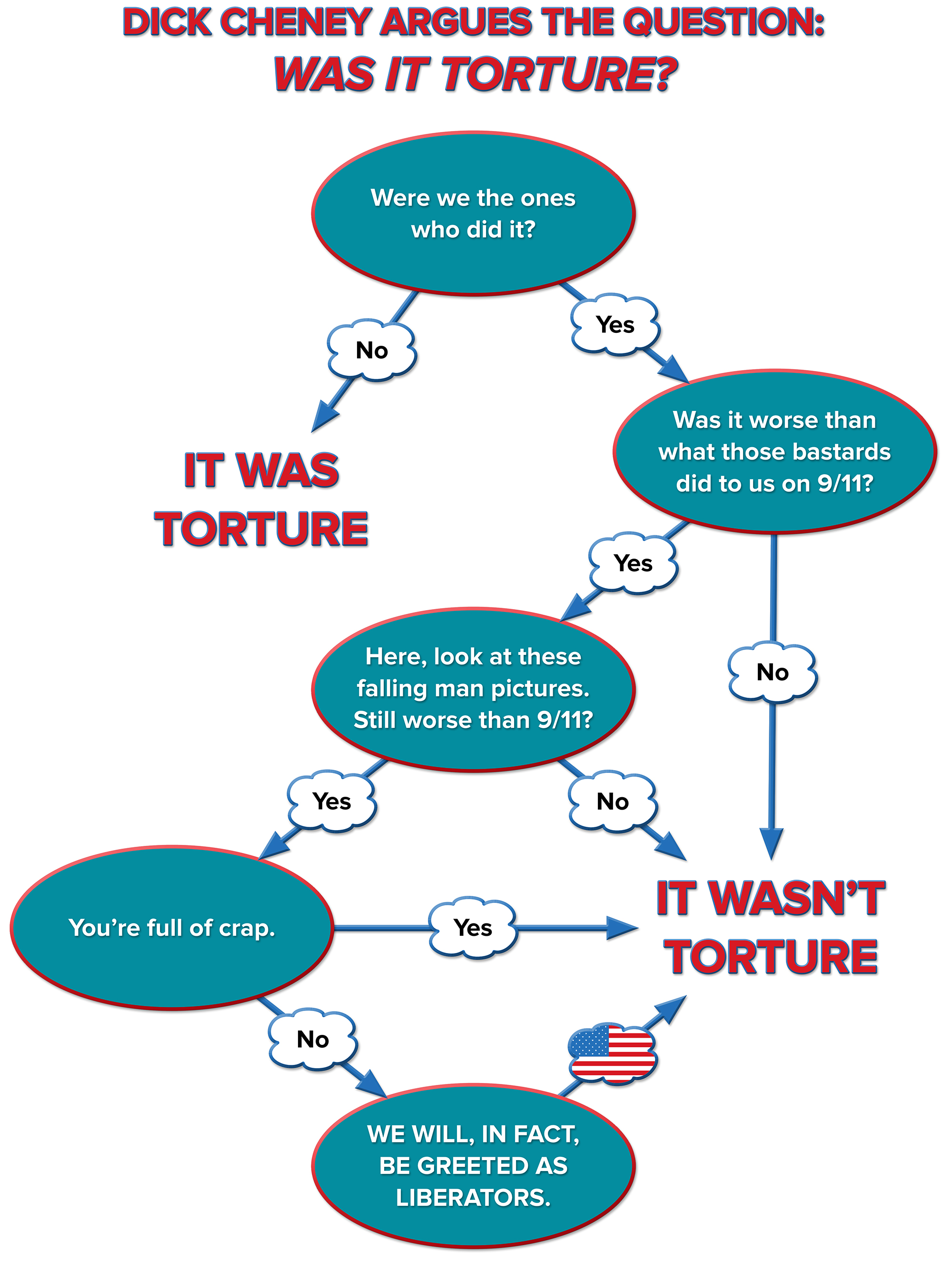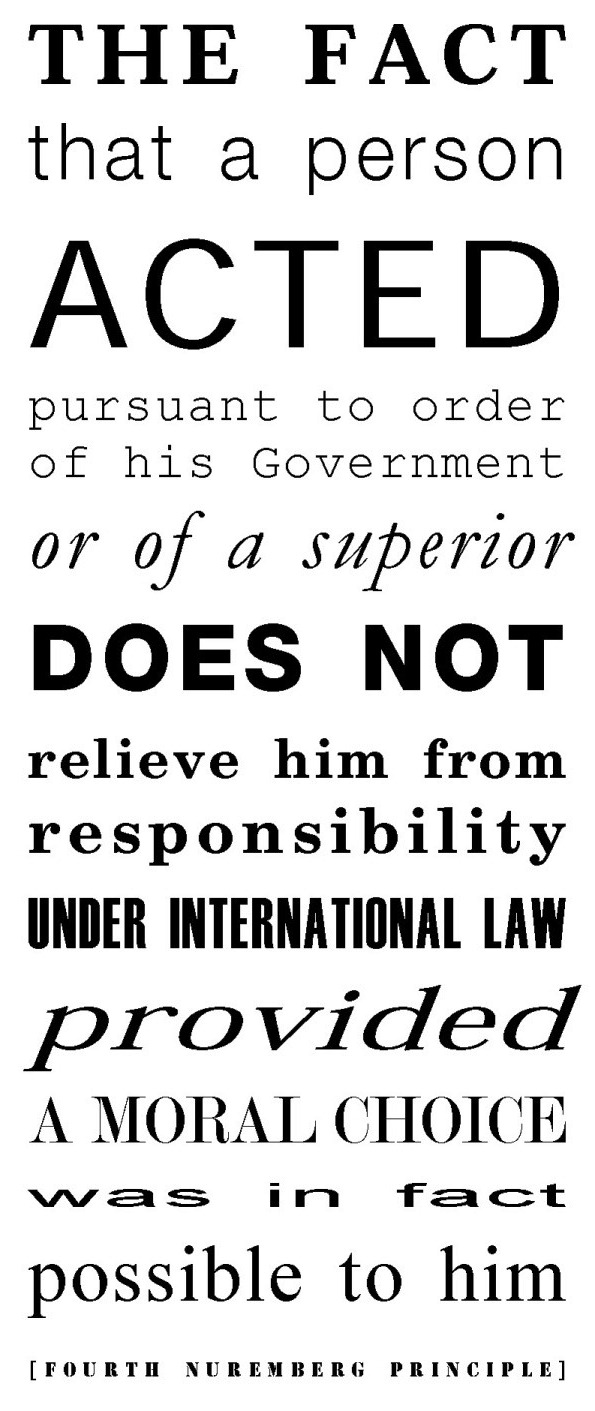
torture
DiFi tortures the CIA
Here’s an email I just sent to everyone in my firm:
| The report of the Senate Select Committee on Intelligence was released a few minutes ago. It can be downloaded here. Everyone should read as much of it as they can bear. |
| Barest summary of the report: In the years after 9/11, the CIA systematically tortured terror suspects and other detainees pursuant to orders from the Executive branch. Senior members of the Bush Administration (presumably including Vice President Cheney) committed war crimes, in knowing violation of both international and US law, under cover of deliberately shoddy and misleading legal advice from, among others, a sitting Federal judge. No one will be prosecuted. |
| The report’s most important conclusion: The torture yielded no actionable intelligence, a fact that should finally put an end to the specious arguments about ends and means. That torture doesn’t “work” is not a surprise. Torture isn’t, and wasn’t, about extracting information. It is, and was, about power, revenge, rage and cruelty. Certainly, torture isn’t a sign of strength, or moral clarity in the face of existential danger. It’s a sign of fear and, ultimately, weakness. |
| Justification for this email: If a meaningful distinction can be made between “law” and “politics” – and, by extension, between what is and what is not appropriate for workplace discussion – my considered judgment is that the attached Senate report is concerned with issues of law. At the very least, the report (in its discussions of the Yoo and Bybee memos) highlights the ethical lapses lawyers can commit when pressured by important clients to reach a favorable conclusion. |
| Jeff |
Into the dustbin of history
Jim Manzi steps off The Corner and says something truly original about the “effectiveness” debate, an evolutionary argument way smarter than the kind of evidence-free, Saddam-has-WMDs ranting one usually hears in that blighted neighborhood:
Let’s assume arguendo that torture works in the tactical sense that I believe has been used so far in this debate; that is, that one can gain useful information reliably in at least some subset of situations through torture that could not otherwise be obtained. Further, assume that we don’t care about morality per se, only winning: defeating our enemies militarily, and achieving a materially advantaged life for the citizens of the United States. It seems to me that the real question is whether torture works strategically; that is, is the U.S. better able to achieve these objectives by conducting systematic torture as a matter of policy, or by refusing to do this? Given that human society is complex, it’s not clear that tactical efficacy implies strategic efficacy.
When you ask the question this way, one obvious point stands out: we keep beating the torturing nations. The regimes in the modern world that have used systematic torture and directly threatened the survival of the United States — Nazi Germany, WWII-era Japan, and the Soviet Union — have been annihilated, while we are the world’s leading nation. The list of other torturing nations governed by regimes that would like to do us serious harm, but lack the capacity for this kind of challenge because they are economically underdeveloped (an interesting observation in itself), are not places that most people reading this blog would ever want to live as a typical resident. They have won no competition worth winning. The classically liberal nations of Western Europe, North America, and the Pacific that led the move away from systematic government-sponsored torture are the world’s winners.
Now, correlation is not causality. Said differently, we might have done even better in WWII and the Cold War had we also engaged in systematic torture as a matter of policy. Further, one could argue that the world is different now: that because of the nature of our enemies, or because of technological developments or whatever, that torture is now strategically advantageous. But I think the burden of proof is on those who would make these arguments, given that they call for overturning what has been an important element of American identity for so many years and through so many conflicts.
Could it be that when Darwinian competition occurs at the level of national systems, “survival of the fittest” means “survival of the most civilized”?
Dismantling the torture state
From yesterday’s executive order on interrogations:
From this day forward, unless the Attorney General with appropriate consultation provides further guidance, officers, employees, and other agents of the United States Government may, in conducting interrogations, act in reliance upon Army Field Manual 2-22.3, but may not, in conducting interrogations, rely upon any interpretation of the law governing interrogation — including interpretations of Federal criminal laws, the Convention Against Torture, Common Article 3, Army Field Manual 2-22.3, and its predecessor document, Army Field Manual 34-52 — issued by the Department of Justice between September 11, 2001, and January 20, 2009.
With a stroke of the pen (and a whole lotta commas), Obama knocks down the Federalist Society’s entire pseudo-scholarly edifice, and fixes the beginning and end of the 2,688-day Lawless Interregnum.
Repudiation
As for our common defense, we reject as false the choice between our safety and our ideals.
Our founding fathers faced with perils that we can scarcely imagine, drafted a charter to assure the rule of law and the rights of man, a charter expanded by the blood of generations.
Those ideals still light the world, and we will not give them up for expedience’s sake.
And so, to all other peoples and governments who are watching today, from the grandest capitals to the small village where my father was born: know that America is a friend of each nation and every man, woman and child who seeks a future of peace and dignity, and we are ready to lead once more.
Recall that earlier generations faced down fascism and communism not just with missiles and tanks, but with the sturdy alliances and enduring convictions.
They understood that our power alone cannot protect us, nor does it entitle us to do as we please. Instead, they knew that our power grows through its prudent use. Our security emanates from the justness of our cause; the force of our example; the tempering qualities of humility and restraint.
Lawyers, war criminals and the Federalist Society
From the declassified summary of the Senate Armed Services Committee’s “Inquiry Into the Treatment of Detainees in U.S. Custody” —
The abuse of detainees in U.S. custody cannot simply be attributed to the actions of “a few bad apples” acting on their own. The fact is that senior officials in the United States government solicited information on how to use aggressive techniques, redefined the law to create the appearance of their legality, and authorized their use against detainees. Those efforts damaged our ability to collect accurate intelligence that could save lives, strengthened the hand of our enemies, and compromised our moral authority.
Someone remind me again why war crimes trials are a non-starter. And if so, why the Bush-Cheney gang can’t just be prosecuted for fraud, or for treason. Can’t we just sue John Yoo and Jay Bybee for malpractice and have them disbarred? Is that too much to ask?
